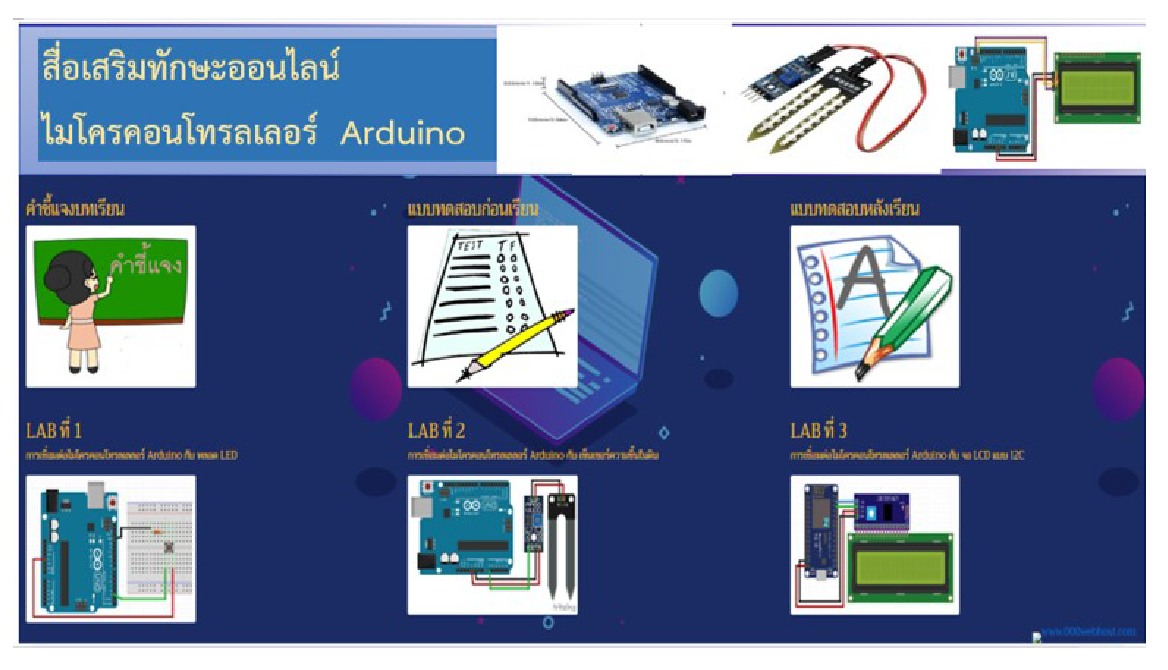The development of online lessons to enhance practical skills with problem-based learning on microcontroller Arduino for undergraduate students
Main Article Content
Abstract
The purposes of this research were as follows: 1) to develop the online supplementary lessons to enhance practical skills with problem-based learning on Microcontroller Arduino for undergraduate students, 2) to evaluate the quality of the online supplementary lessons, 3) to compare the academic achievement of the learners before and after learning, and 4) to evaluate the satisfaction of the learners towards the online supplementary lessons. The sample group were 30 first-year undergraduate students of Computer Education of Nakhon Pathom Rajabhat University who enrolled in the 2/2019 semester selected by purposive sampling. The research apparatuses were as follows: 1) the online supplementary lessons on Microcontroller Arduino, 2) the online supplementary lessons' quality assessment forms, 3) pretests and posttests, and 4) the satisfaction assessment forms of the learners. The statistics used in data analysis were mean, standard deviation, and t-test statistics. The research found that 1) the online supplementary lessons to enhance practical skills with problem-based learning on Microcontroller Arduino for undergraduate students of Computer Education of Nakhon Pathom Rajabhat University had the quality of content and media production at a very good level ( = 4.53, S.D. = 0.57), 2) the academic achievement of the learners after learning was statistically significantly higher than before learning at 0.05, and 3) the overall satisfaction of the learners was at the highest level (
= 4.52, S.D. = 0.59).
Article Details
References
A. Kanhawet, The definition of Smart Home, Available from: https://www.arm.co.th/knowledge.aspx microvsmart (accessed 10 September 2019.)
N. Kongraksa, Factors affecting consumer intent to use the internet of things on wearable devices in Thailand, An independent study submitted in partial fulfillment of the requirements for the degree of master of science program management information systems, Faculty of Commerce and Accountancy Thammasat University, 2017.
P. Kunlimratchat, Internet of things: Current technology trends for future, Eastern Asia University Journal Science and technology edition 10(1) (2016) 29 --36.
Strategic man, technology 3: Internet of things, Available from: http://www.strategic-man.com/articles/detail/WO9eMWmGOUk (accessed 11 January 2020).
Introduction to Arduino, Available from: https://www.arduit ronics.com/article/ (accessed 11 January 2020)
Office of the National Education Commission, The National Education Act Amendments 1999 (2nd Edition) of 2002, Available from:http://www.roiet3.go.th/index.php/ (accessed 10 January 2020)
Ministry of Education, Student-centered teaching, Document sets of reforming guidelines of the schools in Department of General Education, Bangkok: Religion.
Office of the Education Council, Monitoring and Evaluation Report on Education Reform In Education, Bangkok: Century, 2006.
K. Malithong, Education Technology and Innovation, Bang-kok: Aroonprintin, 2002.
M. Tiantong, Courseware Design and Development for CAI, Bangkok: King Mongkut's University of Technology North Bangkok, 2011.
B. Srisaart, Preliminary Research(8th edition), Bangkok: Suwiriyasat, 2010.
K. Ploysang, A study of language and communication learning achievement using problem-based learning, Available from: https://www.mcu.ac.th/article/detail/14381 (accessed 11 January 2020)
K. Chian, P. Supavarasuwat, W. Sunthonkanokpong, S. Tuntrakool, Internet based tutorial lesson on able TV, Journal of Industrial Education 17(1) (2018) 113--119.
N. Zacharis, Evaluating the effects of virtual pair programming on students' achievement and satisfaction, International Journal of Emerging Technologies In Learning 4(3) (2009) 34 -- 39.


